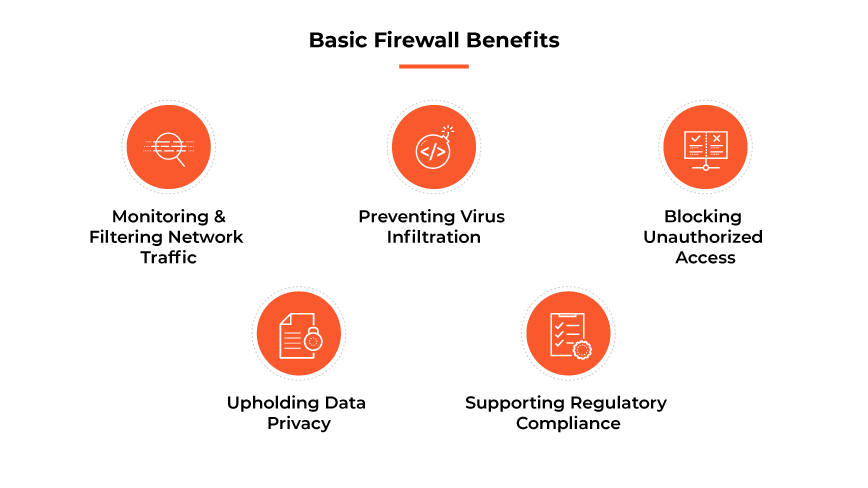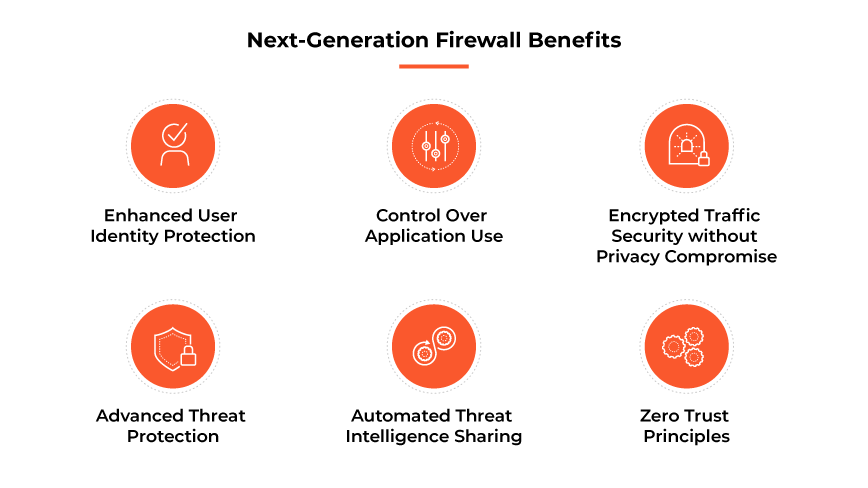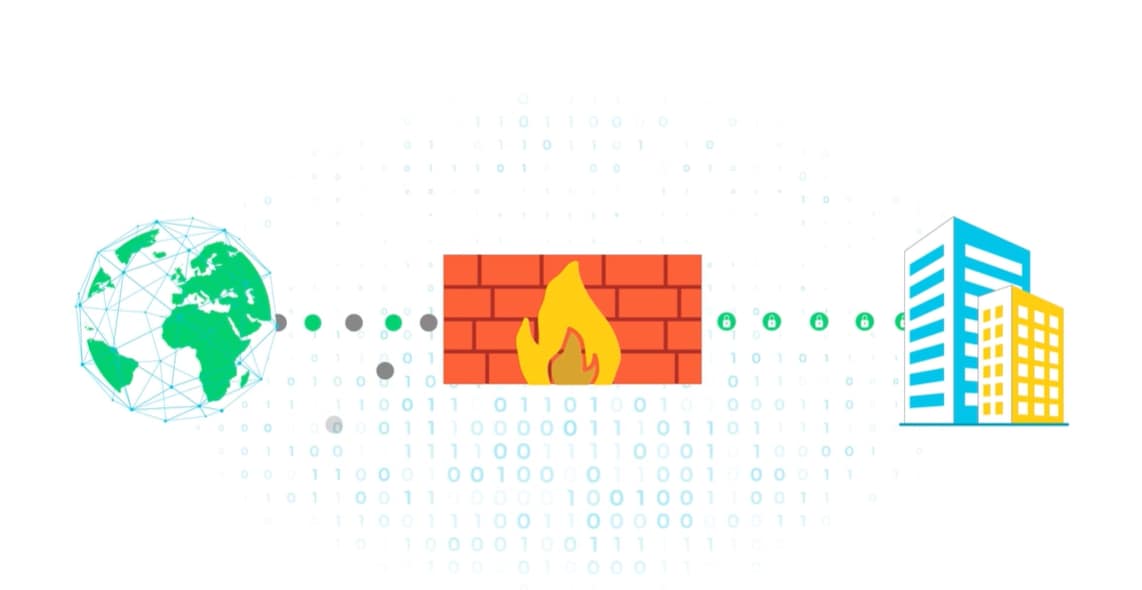What Are the Benefits of a Firewall?
Benefits of firewalls include:
- Monitoring and filtering network traffic
- Preventing virus infiltration
- Blocking unauthorized access
- Upholding data privacy
- Enhancing compliance adherence
- Enhanced user identity protection
- Control over application use
- Encrypted traffic security without privacy compromise
- Advanced threat protection
- Automated threat intelligence sharing
- Zero trust principles
Why Are Firewalls Important?
The importance of firewalls as a crucial line of defense in cyber security cannot be understated. For decades, firewalls have acted as a fundamental shield, safeguarding networks and devices from potential threats. Their primary function is to establish a barrier between secured internal networks and potential untrusted external sources.
In today's interconnected business landscape, enterprises are more exposed than ever to potential threats. Cyberattacks don’t just lead to downtime or data breaches. They can significantly tarnish an enterprise's reputation, erode trust, and lead to financial repercussions. For businesses, firewalls ensure data protection and prevent unauthorized access.
Moreover, as business ecosystems evolve and integrate, the digital perimeter of an organization expands. This expansion results in a larger surface area for potential attacks. Firewalls help oversee and regulate data flow, allowing approved data and blocking harmful or unintended data. This control is important for businesses as they need to ensure data security while maintaining efficient operations.
Firewall Benefits
As times change, so should the methods for protecting businesses. While traditional firewalls offer foundational protection, modern advancements have led to even more sophisticated features to cater to today's complex digital environments and security systems.
Next-Generation Firewalls (NGFWs) are the modern solution in digital protection, offering more advanced variations, such as ML-powered NGFWs, to keep pace with the current threat environment. The evolution of firewalls merges the best parts of traditional technology with the innovative technologies of today, combining the strengths of classic technology with contemporary innovations to provide superior network security.
Basic Firewall Benefits

Monitoring and Filtering Network Traffic
A firewall's primary role is to oversee all data packets that traverse a network.
Stateful inspection firewalls play a significant role in this oversight by monitoring active connections, noting the state and attributes of every data packet, and ensuring nothing slips through unnoticed.
They act as an initial barrier, filtering incoming information to detect potential threats. Monitoring network traffic prevents harmful data or patterns from entering the system, maintaining the security of the internal network.
Preventing Virus Infiltration
Viruses constantly evolve, requiring sophisticated countermeasures. Firewalls, in tandem with antivirus software, serve as an effective barrier against these threats, including various forms of malicious software.
For example, packet filtering firewalls examine each data packet's headers, allowing or blocking them based on set criteria. By analyzing these packets, firewalls can discern malicious patterns associated with known viruses, thereby neutralizing them before they breach the system.
The advent of next-generation firewalls (NGFW) has introduced a higher scrutiny level. These advanced firewalls incorporate traditional mechanisms with newer features, catching and neutralizing even the most advanced viruses.
Blocking Unauthorized Access
With the increasing reliance on digital platforms and private networks, unauthorized access attempts have become more frequent and sophisticated. Firewalls operate as vigilant gatekeepers, overseeing all entry points, preventing hacking, and ensuring that only authorized users can access vital system resources.
Network firewalls play a pivotal role in this, acting as lookouts that oversee all access points within a network. By leveraging access control mechanisms, these firewalls ensure that only trusted sources can communicate with the system.
Upholding Data Privacy
In today's digital landscape, data privacy is paramount. By scrutinizing every piece of data that enters or leaves a network, firewalls prevent unauthorized access and ensure private data remains confidential. As businesses hold vast amounts of sensitive information, from personal details to financial data, the role of firewalls becomes even more pivotal. With security rules and access control measures, firewalls shield data from external threats and ensure businesses can operate in a secure digital space.
Supporting Regulatory Compliance
For many organizations, especially those in regulated industries, adherence to data protection standards isn't just about securing data—it's a legal requirement. Firewalls play a dual role in this context.
They enforce stringent data protection measures by controlling and logging access to sensitive data, ensuring that only authorized individuals can access and modify critical information. Firewalls also maintain comprehensive logs of these activities, which is a crucial feature for audit trails. When regulators or internal auditors need evidence of security measures and activity histories, these logs become invaluable.
By ensuring data integrity and providing verifiable logs, firewalls assist organizations in maintaining compliance, thereby preventing potential legal complications, and ensuring continued trust from stakeholders.
Advanced Firewall Benefits

Enhanced User Identity Protection
Modern firewalls offer precise identification of users regardless of location, device, or operating system. This ensures that security policies are aligned with business needs, granting or denying access based on user identity and not merely IP addresses. Such granularity in control facilitates a safe environment where specific tasks can be permitted to certain user groups, further refining the security landscape.
Control Over Application Use
With the evolving digital workspace, users engage with a variety of application types. More sophisticated products have the ability to accurately identify and control these applications, ensuring that only sanctioned or tolerated apps are accessed. This aids in maintaining security while allowing flexibility in application usage based on business requirements.
Encrypted Traffic Security without Privacy Compromise
With the rise in encrypted web traffic, advanced firewalls provide a mechanism to decrypt malicious traffic while preserving user privacy. This allows organizations to scrutinize potential threats without infringing on user rights or hampering performance.
Advanced Threat Protection
The increasing sophistication of cyber threats calls for advanced security devices and mechanisms. Many modern firewall products provide integrated solutions that coordinate intelligence across various attack vectors, ensuring comprehensive protection against both known and novel threats.
Automated Threat Intelligence Sharing
The sheer volume of threat data can be overwhelming for organizations. Some variations of current firewalls automate the process of threat detection, analysis, and response, pooling insights from a global community and ensuring swift security updates.
Zero Trust Principles
Traditional security models are perimeter-centric, potentially leaving internal threats undetected. The Zero Trust approach inherent to more advanced firewalls requires constant validation and authentication for any action within the network infrastructure. This method ensures that every potential threat, whether internal or external, is identified and mitigated.
Firewall Benefits FAQs
- Filtering network traffic.
- Blocking unauthorized access.
- Permitting legitimate communication.
